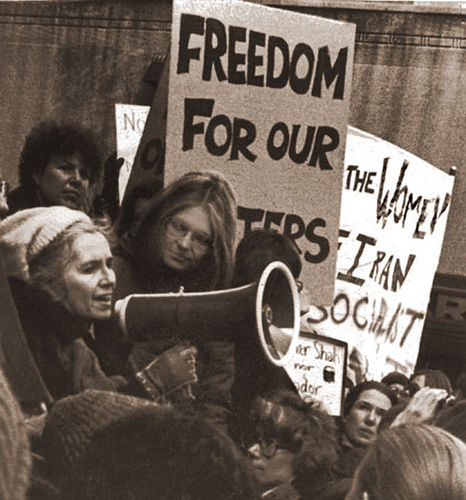When making an accounting of all the great American short-story writers, is Grace Paley the most neglected? Despite just three major collections, she was one of our best–funny, outraged, noble and strange. The author’s time was split among fictional narratives, motherhood and human-rights protesting. In a 1979 People article, Kristin McCurran suggested that perhaps Paley’s literary output had been compromised by time spent on political causes, a trade-off the writer never seemed to regret. An excerpt:
She is an American writer few people have read, but those who have, including her most distinguished peers, think the world of Grace Paley. To Susan Sontag “she is a wonderful writer and a noble citizen.” To Donald Barthelme “Grace Paley is a very good writer and troublemaker.”
Both were by way of explaining why the Sarah Lawrence teacher and short-story writer was in a Washington, D.C. courtroom last week. Her troublemaking had consisted of stepping onto the White House lawn last Labor Day with 10 other members of the War Resisters League and unfurling a banner which read NO NUCLEAR WEAPONS, NO NUCLEAR POWER—U.S. OR USSR. As Grace told superior court Judge Donald S. Smith at her sentencing, “We tried to go about the demonstration in a quiet, gentle way.” The judge’s response: a suspended 180-day sentence, $100 fine and three years’ probation.
At the time of the White House protest, seven fellow War Resisters, on U.S. tourist visas in Moscow, had staged a similar demonstration outside the Kremlin. But while the Washington 11 were being jailed for 30 hours and tried by jury last December, their compatriots in Moscow were released without arrest. Paley’s group did not hesitate to publicize the irony.
Of course her activism has slowed her already painstaking creation. Grace, at 56, has published only two major collections of stories and none since Enormous Changes at the Last Minute in 1974. Indeed, she has been busily seeking confrontations with authorities since the ’60s, when Vietnam war protests took her to Hanoi, Stockholm and Paris. “I think I could have done more for peace,” she admits, “if I’d written about the war, but I happen to love being in the streets.”
Even literary admirers who share her politics probably half wish Paley would chain herself to the typewriter instead. Her characters, as one fond critic described them, are “lonely people, junkies, unwed mothers, losers of all sorts, and the lady downstairs, who is often drunk.” Philip Roth calls her work “splendidly comic and unladylike.” But Paley intends to go on being unladylike, as it were. “I believe that people have to act,” she says. “Billions of dollars are put into what’s called defense, while the needs of the people are neglected.”•
Tags: Grace Paley, Kristin McCurran

